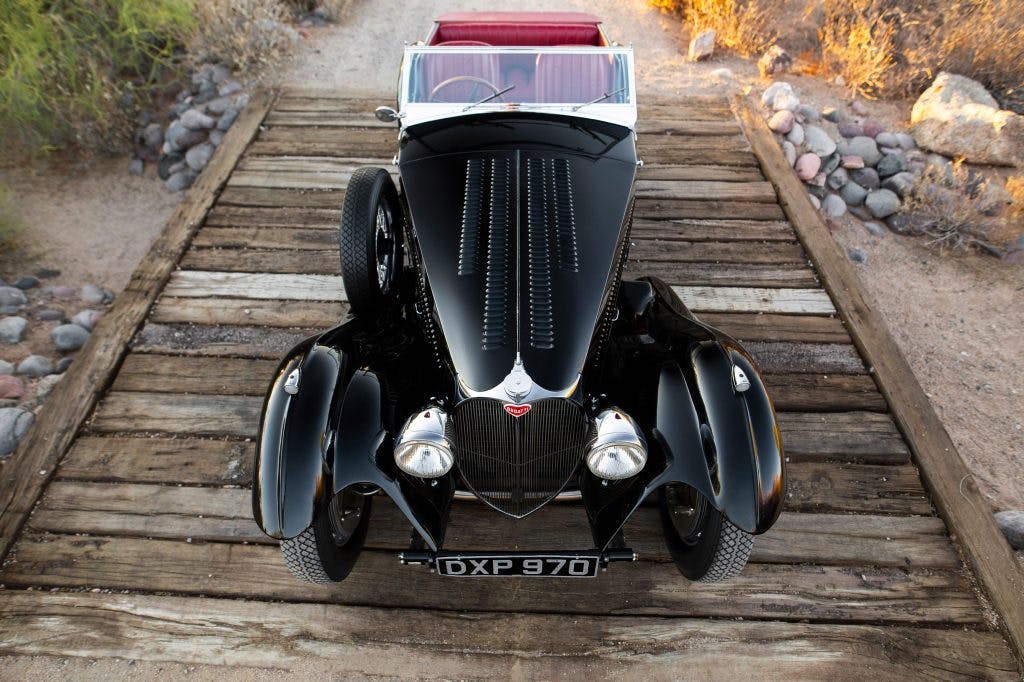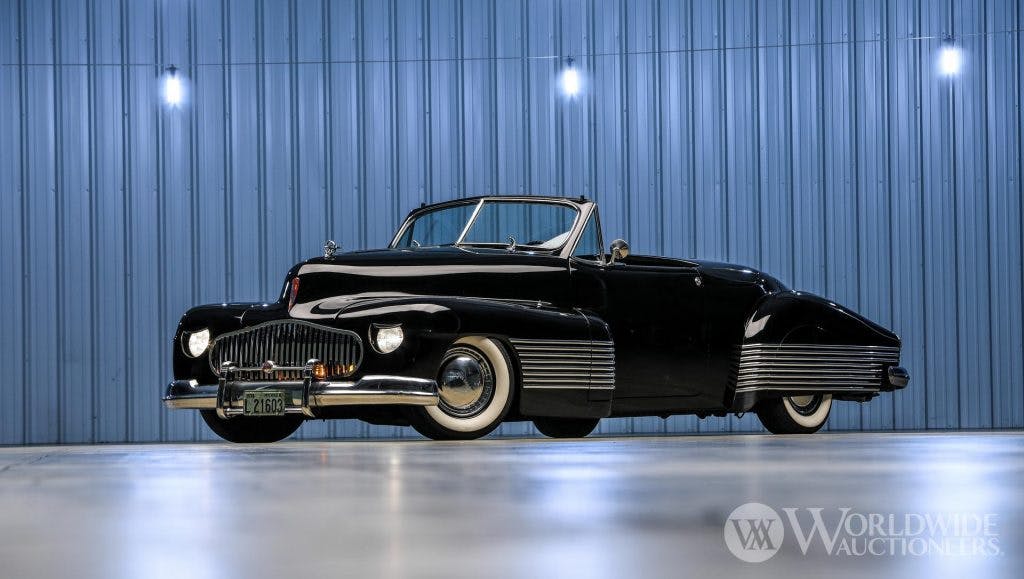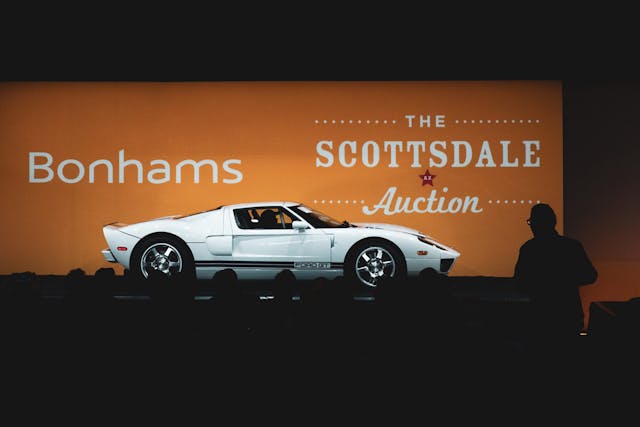What we’re watching at the January auctions
The enthusiast car world usually spends the winter holidays thinking of shiny cars. The January auctions, held in sunny Scottsdale, Arizona, and Kissimmee, Florida, offered a welcome break from cold and dreary conditions—and the opportunity to browse more metal in one week than is possible anywhere else.
The pandemic has forced us to adapt to new—and, let’s face it, less fun—ways of thinking about the January auctions. Barrett-Jackson has postponed its big sale to March, and those auctions left in Scottsdale will be smaller and geared primarily toward online bidders. That means the year-over-year comparisons we typically draw from the January auctions will be, in many respects, meaningless.
However, that doesn’t mean we won’t be watching. There are still several things we can see from the sales that will help us gauge the collector car market in 2021. In addition to watching the external factors, such as the price of oil and the stock market, we’ll be tracking these auction indicators.
1. Format, format, format.
The January auctions are synonymous with big crowds. Barrett-Jackson and Mecum in particular have made selling cars into Superbowl-like spectacles.
Since the pandemic began, however, auction companies have been forced to experiment with other formats, from online-only sales to in-person auctions with COVID safety measures in place. Since March, the best option seems to be a combination of those two—an in-person sale that is also open to online bidders. The hybrid format benefits from having the additional photos and documentation of an online auction but also the excitement of a live event, not to mention the option to inspect the cars in person.
The January auctions provide the biggest tests yet for this new way of doing things. RM Sotheby’s and Bonhams will still be in Scottsdale, and auctioneers will still be calling bids, but a significant share of the participation is expected to come from people sitting behind computers. Gooding & Company, meanwhile, is forgoing the in-person aspect entirely and holding its sale solely online. Even Mecum, which is conducting its signature event in Kissimmee as we speak, has enhanced its digital operation and expects some 20 percent of bidding to happen online. Worldwide, for its part, lacks a true online bidding platform, but will livestream its Scottsdale event (actually being held at its headquarters in Auburn, Indiana) for phone and email bidders.
2. Can auctions still attract consignments?
The biggest challenge for auction houses (as well as private dealers) in 2020 wasn’t selling cars but, rather, finding cars to sell. Blame logistical limitations—just like everyone else, auction representatives are having a harder time inspecting cars in person—as well as the prevailing economic uncertainty, which has potential sellers feeling cautious about putting their cars up for auction.
The number of consignments in the January auctions will be an indication of what to expect, in terms of market activity, in early 2021.
At Kissimmee, the biggest single January sale, consignments are down by approximately one quarter, from 2,955 in 2020 to about 2,200 this year. Worldwide has nearly 70 vehicles, which is more than the 55 they had in 2020. RM Sotheby’s is offering 84 vehicles, down from 143 last year. At the time of writing, Gooding & Company and Bonhams had attracted approximately one-sixth to one-third, respectively, of their consignments from last year. Then there are the no-shows: Leake Auctions, which had nearly 700 cars on offer in 2020, has not announced any vehicles for Scottsdale this year; Barrett-Jackson typically offers close to 1,900 vehicles; and Russo and Steele typically has over 500.
In all, January vehicle auction consignments are down 63 percent from 6,494 to 2,406; however, a lot of that will be made up by Barrett-Jackson in March and with online sales. Meanwhile, there are more cars for sale online than ever. Dedicated online auction platforms such as Bring a Trailer, Cars & Bids, Hemmings, and PCARMarket are offering vehicles at a clip of more than 1,500 vehicles per month, and established auction houses have been sandwiching online sales between major events. Consequently, by March, the deficit of 2,406 vehicles will be gone.
3. Repeat sales

For all that has changed, one of the few constants we have to follow are cars that have appeared previously at auction. From one year to the next, these vehicles may sell better or worse, and in aggregate, show how the market has risen or fallen. This year at Mecum’s Kissimmee event, more than 150 vehicles being offered have sold at an auction before.
4. A test for the top of the market…
The January auctions, although not as focused on the top end as Monterey, have never lacked for these splashy headline sales.
Mecum sold the Bullitt Mustang at its Kissimmee event last year for the then muscle car record of $3,740,000. The Scottsdale top 10 had everything from a 2018 Pagani Huayra Roadster at $2,370,000 (RM Sotheby’s) to a 1932 Hispano-Suiza J12 Dual Cowl Phaeton at $2,425,000 (Gooding & Company).
Million-dollar sales can seem far removed from the concerns of average collectors, but in addition to the fact that they represent an important segment in their own right, their performance at auction has historically been an indicator of where the rest of the market is headed.
This year, Mecum has a range of 289 and 427 Cobras and three 1965 Shelby GT350s, including a GT350R. RM Sotheby’s has a 1955 Jaguar D-Type and a 1937 Bugatti Type 57 that was a no-sale at their 2019 event. Gooding & Company has a 1926 Bugatti Type 37 and continues to offer exceptional Ferrari 275s with a 1966 Ferrari 275 GTB Long Nose consignment. Bonhams is offering a 1959 BMW 507 Series II Roadster along with a 1939 Mercedes-Benz 540K Special Cabriolet A that won best of show at Pebble Beach in 1973. Worldwide is offering a 1934 Cadillac Model 370D V-12 Convertible Sedan and a 1934 Packard Twelve 1107 Phaeton, along with a replica of the Buick Y-Job, but none of their consignments are likely to exceed seven figures.
5. …And for restomods and muscle cars

Worldwide’s Buick Y-Job replica, with its modern Chevrolet LS V-8 and Corvette suspension, is indicative of what will be lost or late with the January auctions this year. The custom or restomod has become so popular at the January auctions that the very best creations often sell for more than stock examples restored to concours standards. At Barrett-Jackson’s Scottsdale auction last year, the number of modified 1969 Chevrolet Camaro Sport Coupes outnumbered the stock examples 28 to 16, and the customized set had a median price that was $11,550 greater at $82,500. Without Barrett-Jackson, which offered nearly 700 customs last year, this segment will be smaller, but it will likely be temporary.
The contraction of the January auctions is also likely to be felt in the muscle car market, although there are still plenty to be had at Mecum Kissimmee. We’ll be watching those slowly to see how this segment, disproportionately impacted by the loss of in-person sales in 2020, might fare in 2021.
6. Sell-through rate still matters
Finally, we’ll be watching the sell-through rate of the auctions. Comparing it to last year won’t be relevant, but there have been several months of auctions since the pandemic began, which will provide a useful comparison. Throughout much of 2020, demand for classic cars remained strong. January auctions, even in contracted form, represent an increase in supply over what we’ve seen from auction companies in recent months. The question will be whether sell-through rates hold up.


